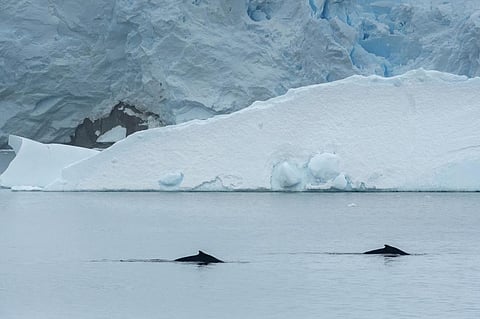

India will continue to support setting up two Marine Protected Areas (MPA) in Antarctica to protect marine life and its ecosystem services, Jitendra Singh, Union minister of state (independent charge) for science and technology and earth sciences, told Down To Earth (DTE) on March 27, 2023.
MPA is a defined region managed for the long-term conservation of marine resources, ecosystem services or cultural heritage.
The Southern Ocean that encircles Antarctica covers around 10 per cent of the global ocean and is home to nearly 10,000 unique polar species. But it is changing.
Climate change is altering habitats such as sea ice and the sheltered seafloor under ice shelves that are home to a variety of species.
Commercial fishery harvest krill, a shrimp-like crustacean that can grow to 6 centimetres in length, to produce fish meal for feeding farmed fish and nutritional supplements for people.
Increased harvesting of krill threatens animals that feed on them. These include fish, whales, seals, penguins and other seabirds.
A 2022 study that analysed over forty years of krill fishery data found that krill fishing was highest in the regions surrounding the Western Antarctic Peninsula and near the South Orkney Islands.
“Climate change and anthropogenic exploitation (commercial fishing) of the region need to be minimised, and therefore MPA is necessary,” BC Choudhary, senior technical advisor at the Wildlife Trust of India, told DTE.
The Southern Ocean has two MPAs — one in the southern shelf of the South Orkney Islands and the other in the Ross Sea. These fully protect only 5 per cent of the ocean.
All types of fishing, other than scientific research, are prohibited within the southern shelf of the South Orkney Islands MPA. Discharges and dumping from fishing vessels are also not allowed.
In the Ross MPA, 72 per cent of the waters are closed to commercial fishing.
“No further MPAs have been established despite three further MPAs being at advanced stages of development,” Karen N Scott, professor at the University of Canterbury, wrote in a 2021 paper published in The Korean Journal of International and Comparative Law.
Since 2012, the European Union and Australia have proposed an MPA in East Antarctica. An MPA was proposed in the Weddell Sea by the EU and Norway and in the waters surrounding the Antarctic Peninsula by Chile and Argentina.
In 2021, India extended its support for designating East Antarctica and the Weddell Sea as MPA.
But according to media reports, China and Russia blocked these efforts at the 41st annual meeting of the Commission for the Conservation of Antarctic Marine Living Resources (CCAMLR).
CCAMLR is an intergovernmental body set up in 1982 to conserve Antarctic marine life. It has 27 members and 10 more countries have acceded to the Convention.
“China and Russia have a different view than the rest of the membership,” Orazio Guanciale, CCAMLR commissioner for Italy, told Mongabay, an environment and science news portal.
In the 41st meeting of CCAMLR, India also expressed interest in the commercial exploitation of krill, according to the publication.
Further, if the proposed MPAs take form in Antarctica, they will contribute to the United Nations 30x30 Framework, which aims to protect 30 per cent of the world’s land and sea. This agreement was reached at the 15th Conference of Parties to the Convention on Biological Diversity in 2022.
“Of the total ocean cover, 30 per cent will be protected. This includes the Arctic and Antarctica,” said M Ravichandran, secretary, Union Ministry of Earth Sciences.
Questions still remain about how each nation will contribute to this goal. Modalities have to be worked out, he said.
As for MPAs in Antarctica, Ravichandran said most countries have agreed in principle in the last CCAMLR. “It will be known in the next Antarctic Treaty Consultative Meeting,” he noted.